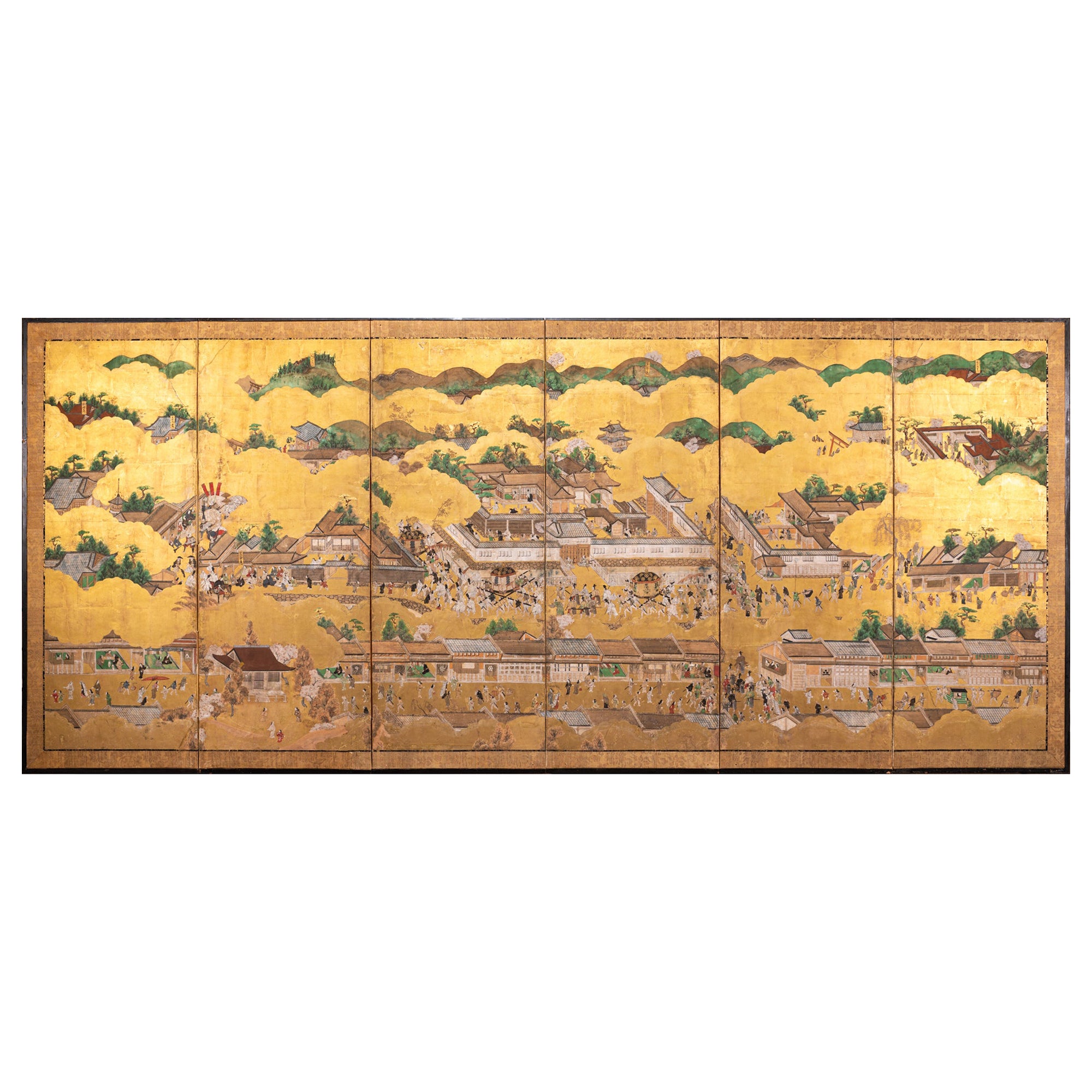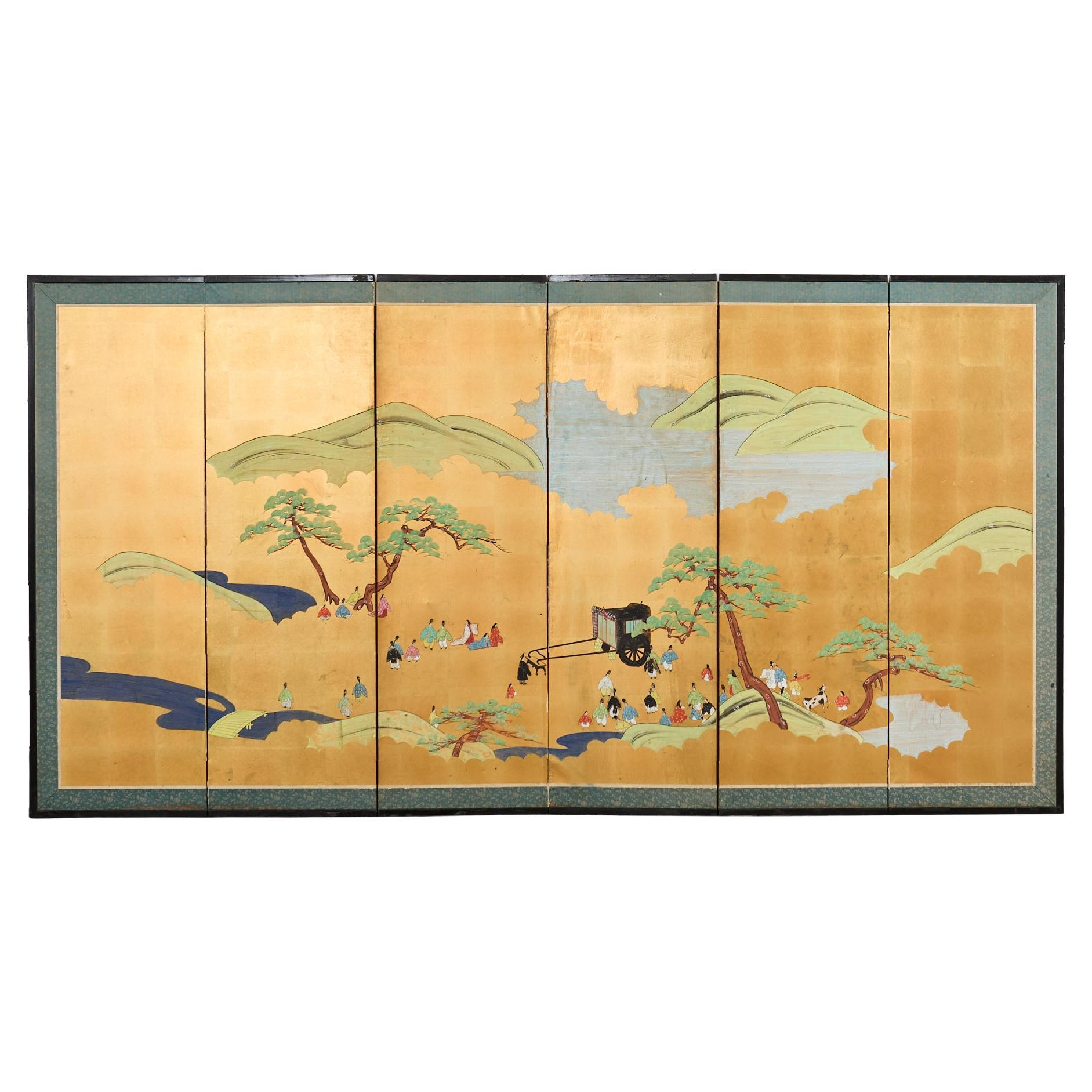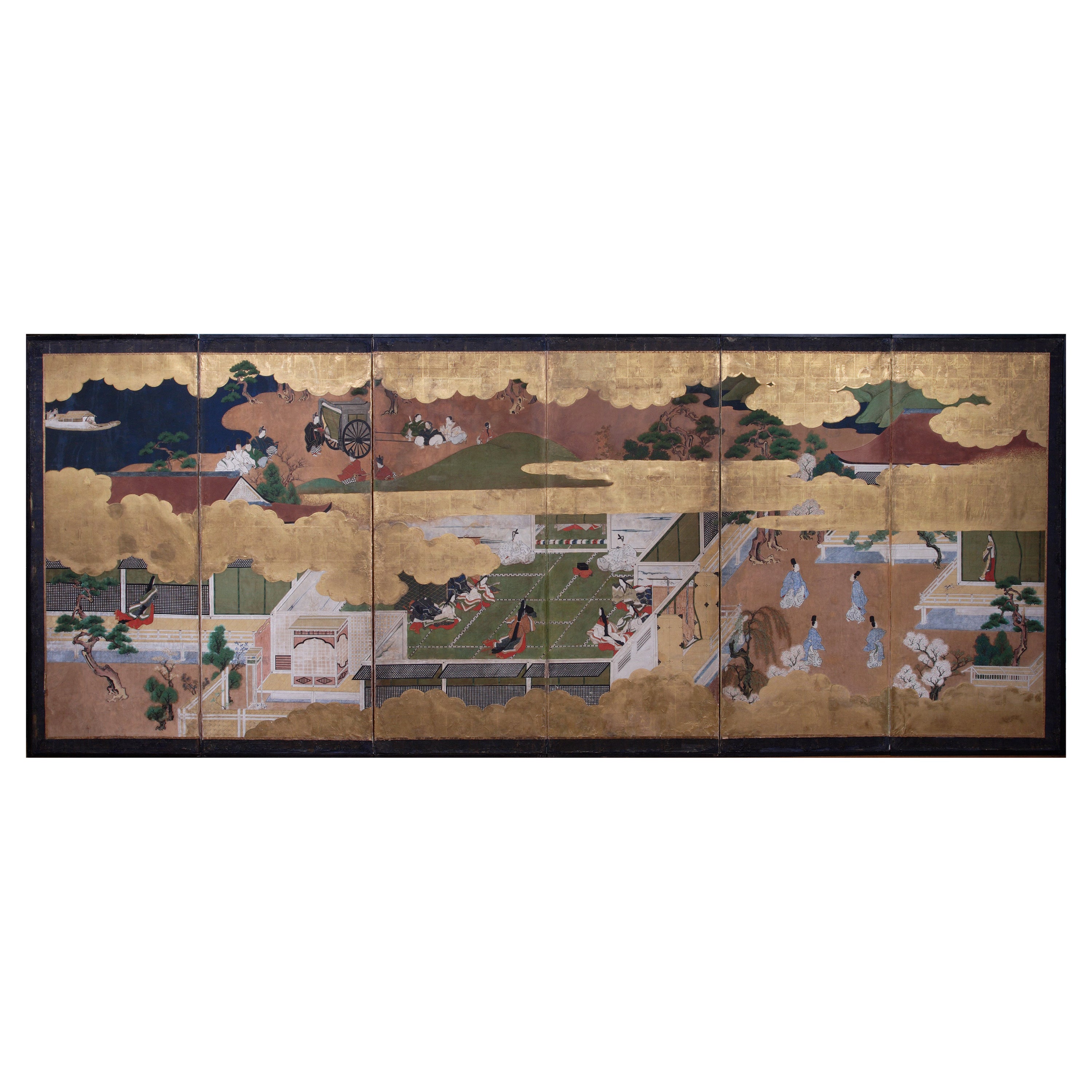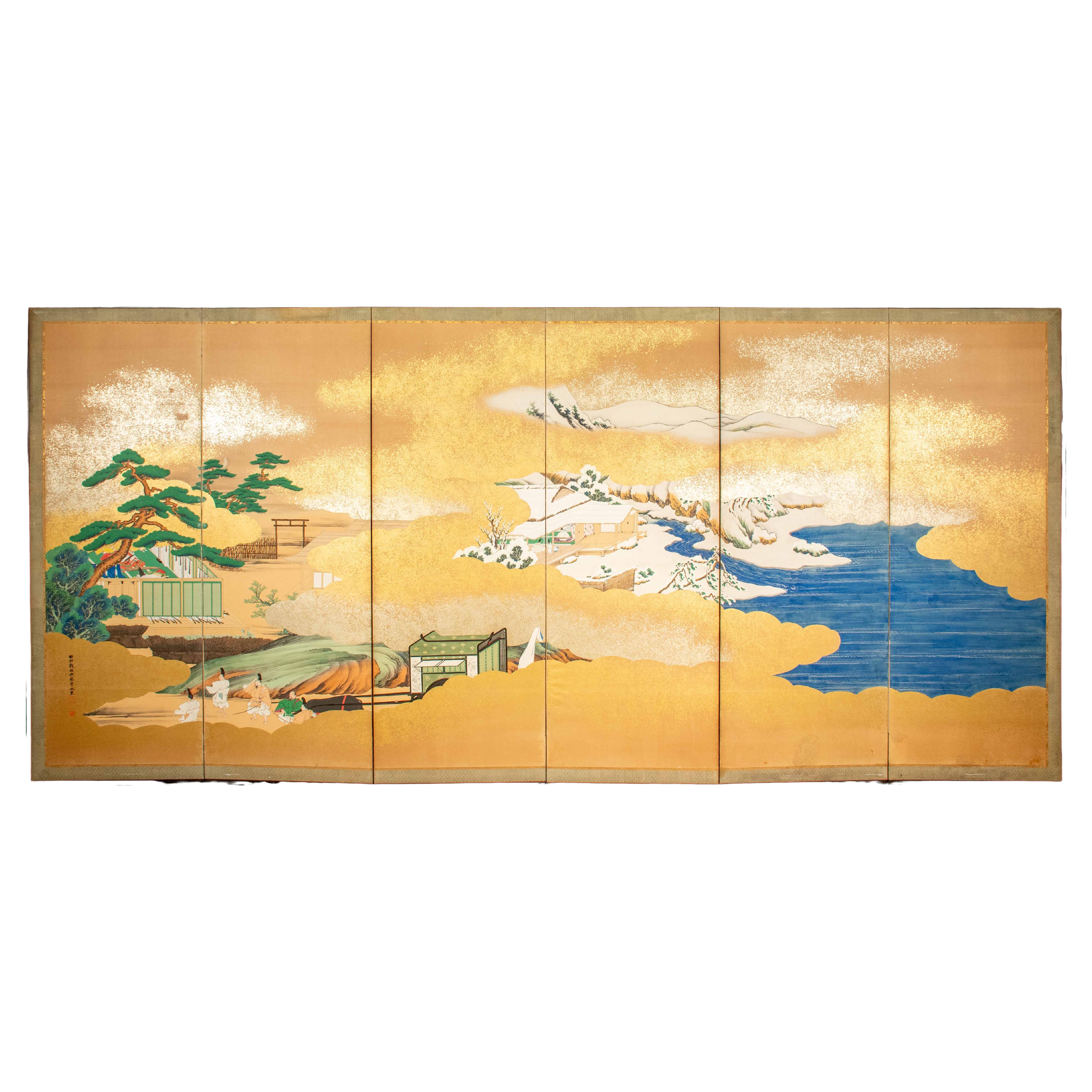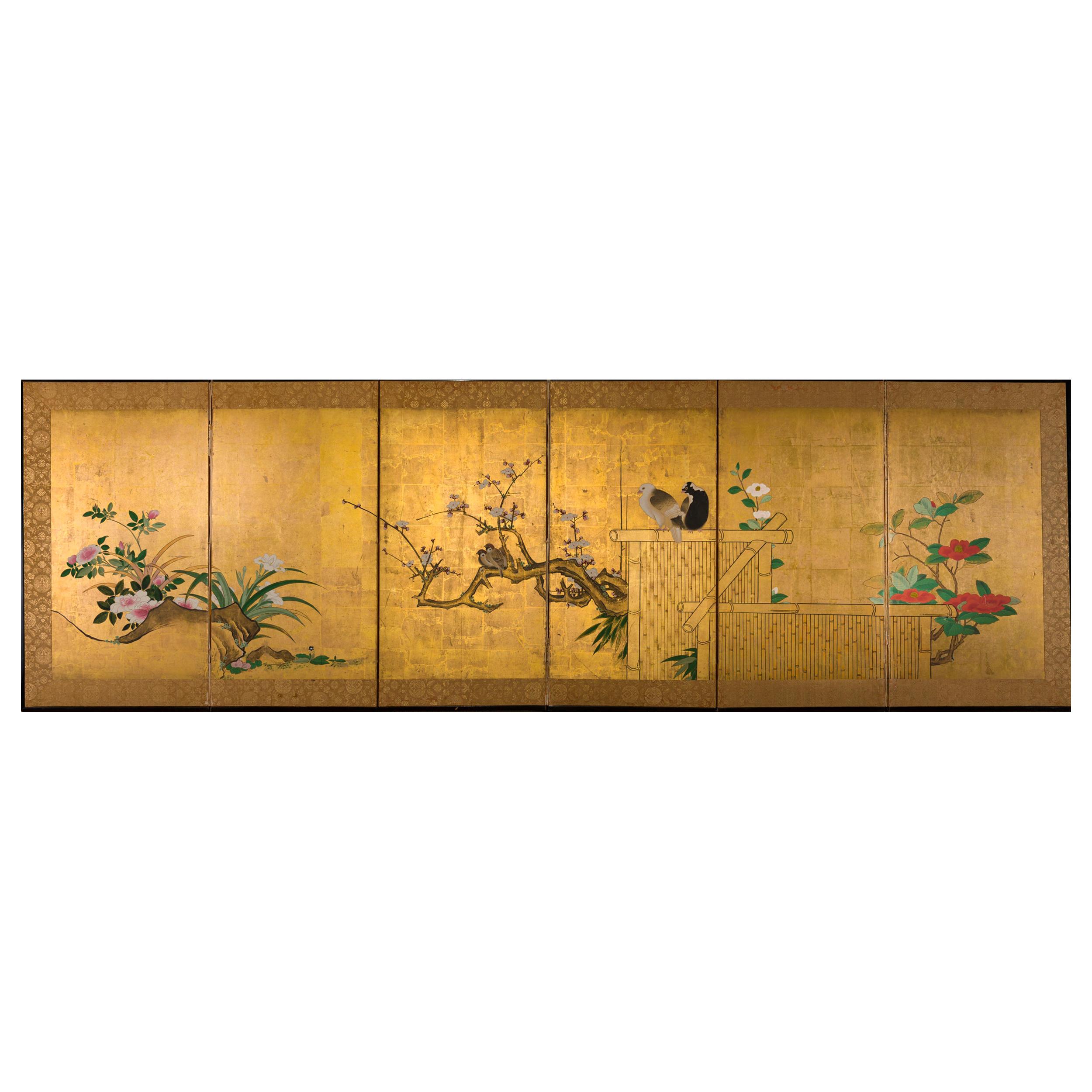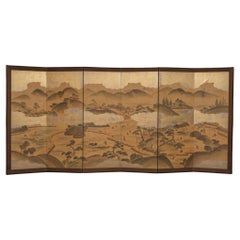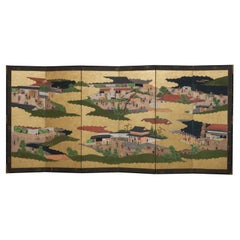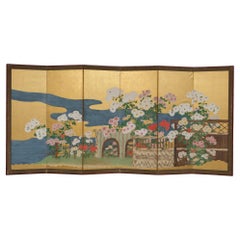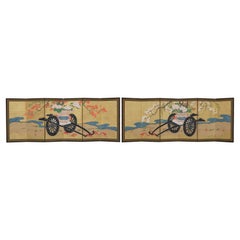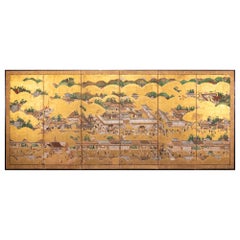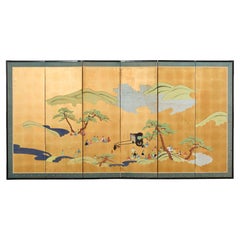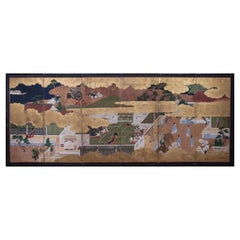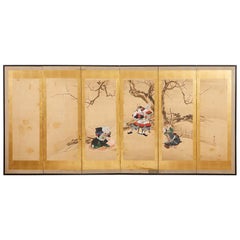Items Similar to Mid-size 6-panel byôbu 屏風 with a scene from The Tale of Genji
Want more images or videos?
Request additional images or videos from the seller
1 of 20
Mid-size 6-panel byôbu 屏風 with a scene from The Tale of Genji
$10,788.75
£8,014.53
€9,000
CA$14,981.43
A$16,348.21
CHF 8,574.91
MX$198,554.47
NOK 107,105.36
SEK 101,219.92
DKK 68,516.06
About the Item
A refined medium-sized six-panel byôbu (folding screen) showcasing a classical autumn court scene from chapter 7 of The Tale of Genji (Genji Monogatari), titled Momiji no Ga (The Autumn Excursion).
The composition depicts a procession of courtiers, attendants, and a young noblewoman from the Heian period, walking through the palace gardens, with the lady leading the way. The landscape is rich with seasonal splendour—pine trees 松 (matsu) and vivid maple trees (momiji) line the banks of a gently flowing brook, where a pair of mandarin ducks (oshidori) swim beneath dense clouds of shimmering gold leaf.
In this chapter, the Emperor hosts an elaborate performance to celebrate the 50th birthday of the retired Emperor Ichi no In. During the festivities, Genji performs a dance before Empress Fujitsubo—his secret former lover—and her niece Wakamurasaki, both of whom are present among the courtly spectators.
Rendered in polychrome natural pigments and ink on mulberry paper and gold leaf. Mounted with a dark golden silk brocade inner border and a broad green outer border. Encased in a black lacquered wooden frame with protective metal fittings chiselled with a diaper pattern.
Dimensions:
Total width: 327.6 cm (2 x 55.8 cm, and 4 x 54 cm); Height: 121.1 cm
The folding screen is ideal for mounting flat on a wall and presenting as a single work of art.
When shipped we will add a certificate of authenticity.
Price including insured shipping.
- Dimensions:Height: 47.68 in (121.1 cm)Width: 128.98 in (327.6 cm)Depth: 0.67 in (1.7 cm)
- Materials and Techniques:
- Place of Origin:
- Period:
- Date of Manufacture:Early to mid-Edo period
- Condition:Repaired. Wear consistent with age and use. In a very good restored condition considering its age, with some minor traces of wear consistent with age. Please refer to the photos for a clear condition reference.
- Seller Location:Amsterdam, NL
- Reference Number:Seller: 813811stDibs: LU7165245503192
About the Seller
4.8
Vetted Professional Seller
Every seller passes strict standards for authenticity and reliability
Established in 1996
1stDibs seller since 2022
22 sales on 1stDibs
Typical response time: 1 to 2 days
- ShippingRetrieving quote...Shipping from: Zwanenburg, Netherlands
- Return Policy
Authenticity Guarantee
In the unlikely event there’s an issue with an item’s authenticity, contact us within 1 year for a full refund. DetailsMoney-Back Guarantee
If your item is not as described, is damaged in transit, or does not arrive, contact us within 7 days for a full refund. Details24-Hour Cancellation
You have a 24-hour grace period in which to reconsider your purchase, with no questions asked.Vetted Professional Sellers
Our world-class sellers must adhere to strict standards for service and quality, maintaining the integrity of our listings.Price-Match Guarantee
If you find that a seller listed the same item for a lower price elsewhere, we’ll match it.Trusted Global Delivery
Our best-in-class carrier network provides specialized shipping options worldwide, including custom delivery.More From This Seller
View AllLarge Japanese 6-panel byôbu 屏風 (folding screen) with genre painting
Located in Amsterdam, NL
Fascinating large six-panel byôbu (folding screen) with a detailed genre painting on goldish silver leaf with different scenes of people at work in a rural mountain village during th...
Category
Early 20th Century Japanese Paintings and Screens
Materials
Silver Leaf
Large Japanese 6-panel byôbu 屏風 (folding screen) with Edo genre painting
Located in Amsterdam, NL
An elaborate, large six-panel byôbu (folding screen) featuring a detailed genre painting on gold leaf, capturing the vibrancy of festive scenes from the Edo period.
Central to the p...
Category
Antique Early 19th Century Japanese Paintings and Screens
Materials
Metal, Gold Leaf
Large Japanese 6-panel byôbu 屏風 (folding screen) with chrysanthemum garden
Located in Amsterdam, NL
A very colourful and captivating large six-panel byôbu (folding screen) with a refined continuous painting of a luscious flower garden filled with many different types of chrysanthemums (kiku), next to a winding river.
This multi-coloured painting is set on a shiny gold-leaf background, and the chrysanthemum flowers are painted by using shell paste (gofun) in low relief.
Several clutches with a great variety of chrysanthemum flowers are in full bloom and they each show their unique form and colour. Varying from white, red, yellow and pink. The flowers bloom all around and on different kinds of bamboo fences and trellises.
In Japan chrysanthemums are believed to represent happiness, love, longevity and joy.
The panels are surrounded by two silk borders, a thin black one, and a wide brown one. The screen is protected by a black and red negoro’nuri...
Category
Antique Late 19th Century Japanese Paintings and Screens
Materials
Gold Leaf
Pair of Japanese hinagata byôbu 雛形屏風 (small folding screens) with flower carts
Located in Amsterdam, NL
An amazing pair of six-panel hinagata byôbu (doll festival folding screens) with a continuous painting on gold leaf showcasing flower carts (hana’guruma) at the edge of a winding river.
Both laden with a large bamboo basket...
Category
Antique Early 19th Century Japanese Paintings and Screens
Materials
Gold Leaf
$4,315 / set
Free Shipping
Pair of Japanese kakejiku 掛け軸 (hanging scrolls) depicting Niô guardians 仁王
Located in Amsterdam, NL
Pair of impressive, antique kakejiku (hanging scrolls) showcasing the awe-inspiring Niô guardians, also referred to as heavenly kings.
Each painting cap...
Category
Antique Early 18th Century Japanese Paintings and Screens
Materials
Brocade, Silk, Paint
$16,782 / set
Free Shipping
Original Japanese Woodblock Print of Playing Children by Katsukawa Shunsen 勝川春扇
By Katsukawa Shunsen
Located in Amsterdam, NL
Original Japanese woodblock print by Katsukawa Shunsen (Shunko II) (1762- circa 1830): five karako (Chinese boys) in traditional garments at play in a snow covered garden, making an ...
Category
Antique 1810s Japanese Prints
Materials
Paper
You May Also Like
Japanese Six Panel Screen: Scenes in and Around Kyoto, 'Rakuchu Rakugai-Zu'
Located in Hudson, NY
The left two panels is the intersection of the Tokaido (an important and historical road that connects Kyoto with Tokyo) at Sanjo (Sanjo translates to "Third Street" and is the main ...
Category
Antique 18th Century Japanese Paintings and Screens
Materials
Gold Leaf
Japanese Showa Six Panel Screen Tales of Genji on Gilt
Located in Rio Vista, CA
Early 20th century Japanese showa period six panel byobu screen depicting an artistic reinterpretation of a scene from the tales or Genji Monogatari. The miniature style of the paint...
Category
20th Century Japanese Showa Paintings and Screens
Materials
Silk, Wood, Paper
Important Japanese six-fold screen depicting The Tale of The Genji, 17th century
Located in Amsterdam, NL
An important Japanese six-fold screen, depicting episodes from The Tale of The Genji
Edo period, 17th century
Ink and colour on gilded paper, H. 155 x W. 380 cm
The Tale of Genji...
Category
Antique 17th Century Japanese Edo Paintings and Screens
Materials
Paint, Paper
Japanese Edo Six Panel Screen Yoshitsune and Benkei
Located in Rio Vista, CA
Spectacular 19th century Japanese late Edo period six-panel byobu screen depicting Yoshitsune and Benkei, two heroes of Japanese folklore. Crafted in ink and natural color pigments on mulberry paper with thick gold leaf borders on each panel. The character Yoshitsune is seated under a blossoming cherry tree in full armor holding a fan. The warrior priest or monk Benkei is depicted kneeling on a leopard skin...
Category
Antique 19th Century Japanese Edo Paintings and Screens
Materials
Brass, Gold Leaf
$3,400 Sale Price
29% Off
A six-panel folding screen depicting scenes from the Tales of Genji
Located in Milano, IT
Six-panel folding screen painted on paper, with pigments, gold dust and gold leaf, depicting two scenes from the Tales of Genji. The landscape is dominated by a Matsu with sinuous br...
Category
Antique 19th Century Japanese Paintings and Screens
Materials
Paper
Japanese Six-Panel Screen Late Winter into Early Spring
Located in Hudson, NY
Japanese six-panel screen: Late winter into early spring, Rimpa style painting of a garden scene with doves on a bamboo fence. Flowers in bloom including ...
Category
Antique Early 19th Century Japanese Edo Paintings and Screens
Materials
Gold Leaf
More Ways To Browse
Antique Metal Panel
Hand Painted 4 Panel Screen
Heian Period
Mid Century Metal Screen
Byobu Japanese Screen Painting
Antique Metal Screen
17th Century Japanese Paintings
Black Lacquer Asian Wall Art
Asian Hand Painted 4 Panel Screen
17th Century Japanese Screens
Tale Of Genji
Six Panel Byobu
Byobu Gold Leaf
4 Panel Hand Painted Japanese Screens
Japanese Folding Screen 4 Panels
4 Panel Asian Silk Screens
4 Panel Japanese Wall Art
4 Panel Asian Wall Screen
